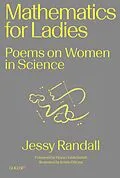Poems about historical women in STEM fields.
Hilarious, heart-breaking, and perfectly pitched, these carefully researched poems about historical women in science, technology, engineering, mathematics, and medicine will bring you to both laughter and outrage in just a few lines. A wickedly funny, feminist take on the lives and work of women who resisted their parents, their governments, the rules and conventions of their times, and sometimes situations as insidious as a lack of a women's bathroom in a college science building.
Discover seashells by the seashore alongside Mary Anning and learn how Elizabeth Blackwell lost her eye. Read about Bertha Pallan's side hustle in the circus, Honor Fell bringing a ferret to her sister's wedding, Annie Jump Cannon cataloguing stars, Mary G. Ross stumping the panel on "What's My Line?," Alice Ball's cure for leprosy, and Roberta Eike stowing away on a research vessel. Some of these poems celebrate women who triumphed spectacularly. Others remember women who barely survived.
Explore the stories of women you may have heard of (Marie Curie, Jane Goodall, Émilie du Châtelet) alongside those of others you may not (Virginia Apgar, Maryam Mirzakhani, Ynes Mexia, Susan La Flesche Picotte, Chien-Shiung Wu). If you have come across Randall's poems in Scientific American, Analog, or Asimov's, you will have already opened the door to these tales, all the more extraordinary because they are true.
Illustrated with Kristin DiVona's portraits for NASA's "Reaching Across the Stars" project, this is a book to share with scientists, feminists, and poets, young and old and of any gender.
Autorentext
Jessy Randall grew up in Rochester, New York and has lived in New York City, Philadelphia PA, Chapel Hill NC, and Colorado Springs, CO. She has been invited to contribute to literary readings in several U.S. cities including NYC, San Francisco CA, Chicago IL, and Seattle WA. During the 2013 Sydney Writers' Festival in Australia, one of her poems ("Why I Had Children") was "published" on a street-cleaning truck. Randall's first book, A Day in Boyland (2007), was a finalist for the Colorado Book Award. Mathematics for Ladies was longlisted for the Philip Levine Poetry Prize.
Pippa Goldschmidt is a writer based in Edinburgh, UK and Frankfurt, Germany. Much of her writing explores the hidden lives of scientists and their work. She is co-editor of I Am Because You Are, a specially commissioned anthology of fiction celebrating general relativity, and Uncanny Bodies, an anthology of fiction, poetry and academic writing inspired by the uncanny. Her short stories, poetry and non-fiction have been published in a variety of magazines and anthologies, most recently in Mslexia, Litro, Scottish Review of Books, New Writing Scotland, and the New York Times, and broadcast on Radio 4.
Working at the intersection of science and design, Kristin DiVona is the Visual Information Specialist for NASA's Chandra X-Ray Observatory, one of NASA's Great Observatories. Her responsibilities for Chandra include spearheading the creation, distribution, and evaluation of large-scale science and technology communications projects.
Klappentext
Poems about historical women in STEM fields.
You know you want to read about Mary Anning's seashells by the seashore, Elizabeth Blackwell losing her eye, Bertha Pallan's side hustle in the circus, Honor Fell bringing a ferret to her sister's wedding, Annie Jump Cannon cataloguing stars, Mary G. Ross stumping the panellists on What's My Line, Alice Ball's cure for leprosy, and Roberta Eike stowing away on a research vessel. Some of these women triumphed spectacularly. Others barely survived.
Carefully researched, emotional, and witty, these poems about historical women in science, technology, engineering, mathematics, and medicine will make you laugh out loud and break your heart in just a few lines. Mathematics for Ladies offers a wickedly funny and feminist take on the lives and work of women who resisted their parents, their governments, the rules and conventions of their times, and sometimes situations as simple and infuriating as a lack of a women's bathroom in a science building on a college campus.
There will be women here you've heard of (Marie Curie, Jane Goodall, Émilie du Châtelet) and women you probably don't know (Virginia Apgar, Maryam Mirzakhani, Ynes Mexia, Susan La Flesche Picotte, Chien-Shiung Wu). If you've seen Randall's poems in Scientific American, Analog, or Asimov's Science Fiction, you know she has a knack for drawing the reader in with extraordinary moments in, and lyrical understanding of, the lives of these women.
Illustrated with Kristin DiVona's portraits for NASA's "Reaching Across the Stars" project, this is a book to share with scientists, feminists, and poets, young and old and of any gender.
